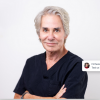0 seconds of 0 secondsVolume 0%
Press shift question mark to access a list of keyboard shortcuts
Keyboard Shortcuts
Shortcuts Open/Close/ or ?
Play/PauseSPACE
Increase Volume↑
Decrease Volume↓
Seek Forward→
Seek Backward←
Captions On/Offc
Fullscreen/Exit Fullscreenf
Mute/Unmutem
Decrease Caption Size-
Increase Caption Size+ or =
Seek %0-9
Dr Nancy Van Laeken MD, FRCSC, Plastic Surgeon discusses risks with the liposuction procedure.
129829 Views
Video transcript
Premier Practitioners
This content is for informational purposes only, and is not intended to be a substitute for professional medical advice, diagnosis or treatment. Always seek the advice of your physician or other qualified healthcare professional with any questions you may have regarding a medical condition.



